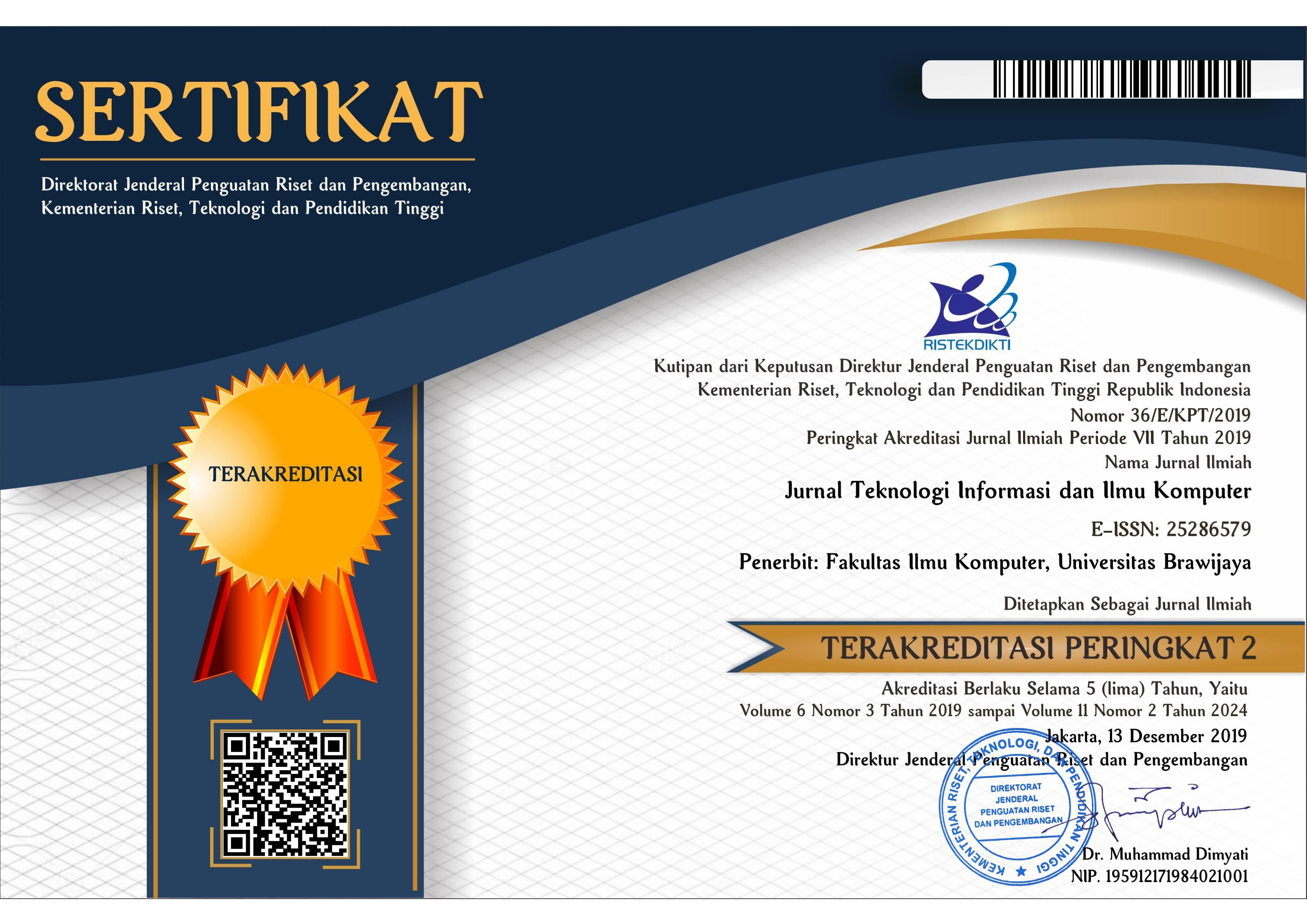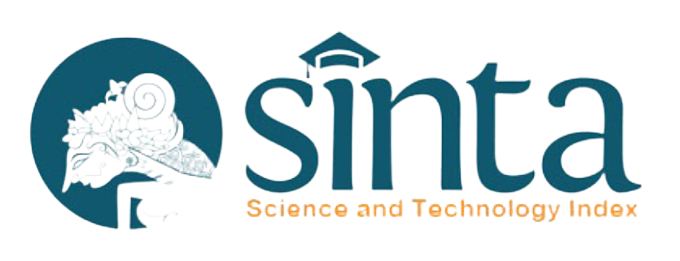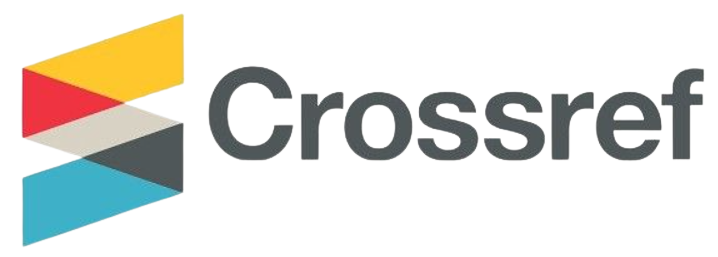Grey Wolf Optimizer Termodifikasi Menggunakan Chaotic Uniform Initialization Untuk Estimasi Effort Cocomo
DOI:
https://doi.org/10.25126/jtiik.2025128901Kata Kunci:
effort estimation, software project, grey wolf optimizer, metaheuristic optimization, COCOMOAbstrak
COCOMO merupakan metode estimasi effort perangkat lunak berbasis parametrik yang banyak digunakan dan fleksibel diimplementasikan pada organisasi skala kecil hingga besar. Akan tetapi, kedua parameter COCOMO, yaitu multiplikatif dan eksponensial kerap memberikan hasil yang kurang presisi serta tidak realistis untuk diterapkan pada lingkungan pengembangan perangkat lunak saat ini. Untuk mengatasi masalah tersebut, beberapa penelitian mengusulkan pendekatan berbasis pencarian untuk mendapatkan nilai parameter yang tepat dengan menggunakan algoritma optimasi metaheuristik. Grey Wolf Optimizer (GWO) merupakan salah satu algoritma optimasi yang bisa menghindari jebakan optimum lokal yang sering dialami oleh algoritma berbasis swarm intelligence. Namun, GWO kurang dalam hal diversity populasi yang membuat banyak kandidat solusi tidak mampu menjangkau ruang pencarian secara merata. Untuk mengatasi masalah tersebut, penelitian ini mengusulkan GWO termodifikasi berupa chaotic uniform initialization agar bisa meningkatkan diversity populasi. Metode yang diusulkan ini membangkitkan dua populasi awal yang masing-masing menggunakan teknik chaos dan acak. Setiap kandidat solusi pada kedua populasi tersebut diseleksi berdasarkan nilai fitness tertentu yang pada akhirnya akan membentuk satu populasi awal yang memiliki diversity yang lebih baik. Eksperimen pada penelitian ini menggunakan tiga himpunan data dari NASA. Untuk mendapatkan teknik chaos terbaik, dilakukan komparasi terhadap tujuh teknik chaos. Metode yang diusulkan kemudian dikomparasikan dengan algoritma GWO standar dan satu varian GWO terkini. Hasil penelitian menunjukkan bahwa metode yang diusulkan beserta teknik chaos circle terbukti mampu memperbaiki diversity populasi sehingga meningkatkan performa akurasi estimasi COCOMO. Metode yang diusulkan ini dimungkinkan untuk diintegrasikan pada alat bantu estimasi effort perangkat lunak yang biasa digunakan oleh para manajer proyek.
Abstract
COCOMO is a parametric-based software effort estimation method that is widely used and flexible to implement in small to large scale organizations. However, the two COCOMO parameters, namely multiplicative and exponential, often provide results that lack precision and are not realistic to apply to the current software development environment. To overcome this problem, several studies have proposed search-based approach to obtain appropriate parameter values using metaheuristic optimization algorithms. Grey Wolf Optimizer (GWO) is an algorithm that can avoid the local minimum trap that is often experienced by other swarm intelligence algorithms. However, GWO lacks population diversity which makes candidate solutions unable to cover the search space evenly. This study proposes chaotic uniform initialization to increase population diversity. The proposed method generates two initial populations using chaotic and random techniques respectively. Each candidate solution in the two populations is selected based on a certain fitness value which will ultimately produce an initial population that has better diversity. The experiment in this study used three data sets from NASA. To get the best chaos technique, a comparison of seven chaos techniques was carried out. The proposed method is then compared with the standard GWO algorithm and a current GWO variant. The research results show that the proposed method and the chaos circle technique are proven to be able to improve population diversity thereby increasing the accuracy of COCOMO. The proposed method is possible to integrated into software effort estimation tools commonly used by project managers.
Downloads
Referensi
ALI, S.S. et al. 2023. “Heterogeneous Ensemble Model to Optimize Software Effort Estimation Accuracy.” IEEE Access 11(February): 27759–92.
AMARENDRA et al. 2023. Forecast Analysis: Enterprise Application Software, Worldwide. https://www.gartner.com/en/documents/5012231.
ARDIANSYAH, A., Ferdiana, R., & Permanasari, A.E., 2022. “MUCPSO: A Modified Chaotic Particle Swarm Optimization with Uniform Initialization for Optimizing Software Effort Estimation.” Applied Sciences 12(3): 1081. https://www.mdpi.com/2076-3417/12/3/1081.
BOEHM, B., ABTS, C., & CHULANI, S., 2000. “Software Development Cost Estimation Approaches – A Survey.” Annals of Software Engineering 10(2000): 177–205.
CAI, Z. et al. 2019. “Quadrotor Trajectory Tracking and Obstacle Avoidance by Chaotic Grey Wolf Optimization-Based Active Disturbance Rejection Control.” Mechanical Systems and Signal Processing 128: 636–54. https://doi.org/10.1016/j.ymssp.2019.03.035.
CHHABRA, S., & SINGH, H., 2020. “Optimizing Design of Fuzzy Model for Software Cost Estimation Using Particle Swarm Optimization Algorithm.” International Journal of Computational Intelligence and Applications 19(1): 1–16.
FARIS, H. et al. 2018. “Knowledge-Based Systems An Efficient Binary Salp Swarm Algorithm with Crossover Scheme for Feature Selection Problems.” Knowledge-Based Systems 154(January): 43–67. https://doi.org/10.1016/j.knosys.2018.05.009.
HAO, P., & SOBHANI, B., 2021. “Application of the Improved Chaotic Grey Wolf Optimization Algorithm as a Novel and Efficient Method for Parameter Estimation of Solid Oxide Fuel Cells Model.” International Journal of Hydrogen Energy 46(73): 36454–65. https://doi.org/10.1016/j.ijhydene.2021.08.174.
IBRAHIM, R.A., ELAZIZ, M.A., & LU, S., 2018. “Chaotic Opposition-Based Grey-Wolf Optimization Algorithm Based on Differential Evolution and Disruption Operator for Global Optimization.” Expert Systems with Applications 108: 1–27. https://doi.org/10.1016/j.eswa.2018.04.028.
JORGENSEN, M., & SHEPPERD, M., 2007. “A Systematic Review of Software Development Cost Estimation Studies.” IEEE Transactions on Software Engineering 33(1): 33–53.
KOCAGUNELI, E., & MENZIES, T., 2013. “Software Effort Models Should Be Assessed via Leave-One-out Validation.” Journal of Systems and Software 86(7): 1879–90. http://dx.doi.org/10.1016/j.jss.2013.02.053.
KOHLI, M., & ARORA, S., 2018. “Chaotic Grey Wolf Optimization Algorithm for Constrained Optimization Problems.” Journal of Computational Design and Engineering 5(4): 458–72. https://doi.org/10.1016/j.jcde.2017.02.005.
LANGDON, W.B., DOLADO, J., SARRO, F., & HARMAN, M., 2016. “Exact Mean Absolute Error of Baseline Predictor, MARP0.” Information and Software Technology 73: 16–18. http://dx.doi.org/10.1016/j.infsof.2016.01.003.
LANGSARI, K., & SARNO, R., 2017. “Optimizing Effort and Time Parameters of Cocomo Ii Estimation Using Fuzzy Multi-Objective PSO.” International Conference on Electrical Engineering, Computer Science and Informatics (EECSI) 4(September): 466–71.
LI, Y., LIN, X., & LIU, J., 2021. “An Improved Gray Wolf Optimization Algorithm to Solve Engineering Problems.” Sustainability (Switzerland) 13(6): 1–23.
MENZIES, T. et al. 2017. “Negative Results for Software Effort Estimation.” Empirical Software Engineering 22(5): 2658–83. http://dx.doi.org/10.1007/s10664-016-9472-2.
MIRJALILI, S., & GANDOMI, A.H., 2017. “Chaotic Gravitational Constants for the Gravitational Search Algorithm.” Applied Soft Computing Journal 53: 407–19. http://dx.doi.org/10.1016/j.asoc.2017.01.008.
MIRJALILI, S., MIRJALILI, S.M., & LEWIS, A., 2014. “Grey Wolf Optimizer.” Advances in Engineering Software 69: 46–61. http://dx.doi.org/10.1016/j.advengsoft.2013.12.007.
PARWITA, I.M.M., SARNO, R., & PUSPANINGRUM, A., 2017. “Optimization of COCOMO II Coefficients Using Cuckoo Optimization Algorithm to Improve the Accuracy of Effort Estimation.” In 2017 11th International Conference on Information & Communication Technology and System (ICTS), IEEE, 99–104. http://ieeexplore.ieee.org/document/8265653/.
PUTRI, R.R., SIAHAAN, D.O., & FATICHAH, C., 2022. “Improving the Accuracy of COCOMO II Using Extended Gamma GWO.” 2022 International Seminar on Intelligent Technology and Its Applications: Advanced Innovations of Electrical Systems for Humanity, ISITIA 2022 - Proceeding: 145–50.
PUTRI, R.R., SIAHAAN, D.O., & FATICHAH, C., 2021. “Improve the Accuracy of Software Project Effort and Cost Estimates in COCOMO II Using GWO.” Proceedings - International Conference on Informatics and Computational Sciences 2021-Novem: 128–33.
SACHAN, R.K. et al. 2016. “Optimizing Basic COCOMO Model Using Simplified Genetic Algorithm.” Procedia Computer Science 89: 492–98. http://dx.doi.org/10.1016/j.procs.2016.06.107.
SHELDON, J.W., 1994. “Recollections of the First Software Company.” IEEE Annals of the History of Computing 16(2): 65–71.
SHEN, Y., WEI, L., & ZENG, C., 2015. 9140 Lecture Notes in Computer Science (including subseries Lecture Notes in Artificial Intelligence and Lecture Notes in Bioinformatics) Swarm Diversity Analysis of Particle Swarm Optimization. eds. Ying Tan et al. Cham: Springer International Publishing. https://link.springer.com/10.1007/978-3-319-20466-6.
SHEPPERD, M., & MACDONELL, S., 2012. “Evaluating Prediction Systems in Software Project Estimation.” Information and Software Technology 54(8): 820–27. https://linkinghub.elsevier.com/retrieve/pii/S095058491200002X.
SHI, Y., & EBERHART, R.C., 2008. “Population Diversity of Particle Swarms.” 2008 IEEE Congress on Evolutionary Computation, CEC 2008: 1063–67.
ZAKARIA, N.A. et al. 2021. “Optimized COCOMO Parameters Using Hybrid Particle Swarm Optimization.” International Journal of Advances in Intelligent Informatics 7(2): 177. http://ijain.org/index.php/IJAIN/article/view/583.
Unduhan
Diterbitkan
Terbitan
Bagian
Lisensi
Hak Cipta (c) 2025 Jurnal Teknologi Informasi dan Ilmu Komputer

Artikel ini berlisensiCreative Commons Attribution-ShareAlike 4.0 International License.

Artikel ini berlisensi Creative Common Attribution-ShareAlike 4.0 International (CC BY-SA 4.0)
Penulis yang menerbitkan di jurnal ini menyetujui ketentuan berikut:
- Penulis menyimpan hak cipta dan memberikan jurnal hak penerbitan pertama naskah secara simultan dengan lisensi di bawah Creative Common Attribution-ShareAlike 4.0 International (CC BY-SA 4.0) yang mengizinkan orang lain untuk berbagi pekerjaan dengan sebuah pernyataan kepenulisan pekerjaan dan penerbitan awal di jurnal ini.
- Penulis bisa memasukkan ke dalam penyusunan kontraktual tambahan terpisah untuk distribusi non ekslusif versi kaya terbitan jurnal (contoh: mempostingnya ke repositori institusional atau menerbitkannya dalam sebuah buku), dengan pengakuan penerbitan awalnya di jurnal ini.
- Penulis diizinkan dan didorong untuk mem-posting karya mereka online (contoh: di repositori institusional atau di website mereka) sebelum dan selama proses penyerahan, karena dapat mengarahkan ke pertukaran produktif, seperti halnya sitiran yang lebih awal dan lebih hebat dari karya yang diterbitkan. (Lihat Efek Akses Terbuka).















